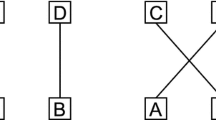Abstract
The concept of indiscernibility in a structure is analysed with the aim of emphasizing that in asserting that two objects are indiscernible, it is useful to consider these objects as members of (the domain of) a structure. A case for this usefulness is presented by examining the consequences of this view to the philosophical discussion on identity and indiscernibility in quantum theory.
Similar content being viewed by others
References
Boolos, G. S. and Jeffrey, R. C.; 1989, Computability and Logic, Cambridge University Press, 3rd. ed.
O. Bueno S. French (1999) ArticleTitle‘Infestation or Pest Control: The Introduction of Group Theory into Quantum Mechanics’ Manuscrito 22 IssueID2 37–68
Cantor, G.: 1955, Contributions to the Founding of the Theory of Transfinite Numbers, Dover.
Castellani, E.: 1998, ‘Galilean Particles: An Example of Constitution of Objects’, in E. Castellani (ed.), Interpreting Bodies: Classical and Quantum Objects in Modern Physics, Princeton University Press, pp. 181–194.
Church, A.: 1956, Introduction to Mathematical Logic, Vol. 1, Princeton University Press.
Cohen, P. J.: 1966, Set Theory and the Continuum Hypothesis, W. Benjamin.
Fraenkel, A. A.: 1922, ‘The Notion of “Definite” and the Independence of the Axiom of Choice’, reprinted in van Heijenoort, From Frege to Gödel: A Source Book in Mathematical Logic, 1879-1931, Harvard University Press, 1967, pp. 284–289.
Fraenkel, A. A., Bar-Hillel, Y. and Levy, A.: 1973, Foundations of Set Theory, North-Holland.
Frege, G.: 1879, Begriffsschrift, eine der aritmetischen nachgebildete Formalsprache des reinen Denkens, Halle; translated in van Heijenoort, J., From Frege to Gödel: A Source Book in Mathematical Logic, 1879-1931, Harvard University Press, 1967, pp. 1–82.
Frege, G.: 1884, Die Grundlagen der Arithmetik-Eine logisch mathematische Untersuchung über den Begriff der Zahl, Breslau.
Frege, G.: 1893, Grundgesetze der Arithmetik, begriffsschriftlich abgeleitet, Vol. 1, Jena.
S. French (1989) ArticleTitle‘Why the Principle of the Identity of Indiscernibles is not Contingently True Either’ Synthese 78 141–166 Occurrence Handle10.1007/BF00869370 Occurrence HandleMR994148
French, S.: 1999, ‘Identity and Individuality in Quantum Theory’, Stanford Encyclopedia of Philosophy, http://plato.stanford.edu.
S. French D. Krause (1995) ArticleTitle‘Vague Identity and Quantum Non-Individuality’ Analysis 55 IssueID1 20–26
S. French D. Krause (2003) ArticleTitle‘Quantum Vagueness’ Erkenntnis 59 97–124 Occurrence Handle10.1023/A:1023921928559 Occurrence HandleMR1992012
D. Hilbert W. Ackermann (1950) Principles of Mathematical Logic Chelsea Publishing Co NY
Hodges, W.: 1983, ‘Elementary Predicate Logic’, in D. Gabbay and F. Guenthner (eds.), Handbook of Philosophical Logic, D. Reidel, Vol. I, pp. 1–131.
Huggett, N.: ‘What Is an Elementary Quarticle?’, forthcoming.
Jech, T.: 1997, Set Theory, Springer, 2nd. ed.
M. Krasner (1938) ArticleTitle‘Une généralization de la notion de corps’ J. de Math. Pures et Appl. 27 367–385
D. Krause S. French (1995) ArticleTitle‘A Formal Framework for Quantum Non-individuality’ Synthese 102 195–214 Occurrence Handle10.1007/BF01063905
E. J. Lowe (1994) ArticleTitle’Vague Identity and Quantum Indeterminacy’ Analysis 54 101–106
Lowe, E. J.: 1999, ‘Objects and Criteria of Identity’, in B. Hale and C. Wright (eds.), A Companion to the Philosophy of Language, Blackwell., pp. 613–633.
Mendelson, E.: 1997, Introduction to Mathematical Logic, Chapman & Hall, 4th. ed.
H. W. Noonan (1995) ArticleTitle‘Lowe on Vague Identity and Quantum Indeterminacy’ Analysis 55 14–191
J. Odrowaz-Sypniewska (2001) ArticleTitle‘Quantum Indeterminacy without Vague Identity’ Analysis 61 65–69 Occurrence Handle10.1111/1467-8284.00271
Robbin, J. W.: 1969, Mathematical Logic: A First Course, W. A. Benjamin.
Rogers, H.: 1967, ‘Some Problems of Definability in Recursive Function Theory’, in J. N. Crossley (ed.), Sets, Models and Recursion Theory, Proceedings of the Summer School in Mathematical Logic and Tenth Logic Colloquium, Leicester, Aug.–Sept. 1965, North-Holland, pp. 183–201.
A. S. Sant’Anna (2000) ArticleTitle‘Elementary Particles, Hidden Variables, and Hidden Predicates’ Synthese 125 IssueID1/2 233–245 Occurrence Handle10.1023/A:1005272827990
Schrödinger, E.: 1952, Science and Humanism, Cambridge University Press.
Schrödinger, E.: 1950/1998, ‘What Is an Elementary Particle?’, reprinted in E. Castellani (ed.), Interpreting Bodies: Classical and Quantum Objects in Modern Ohysics, Princeton University Press, 1998, pp. 197–210.
Sebastião e Silva, J.: 1944, ‘Para uma teoria geral dos homomorfismos’, in Obras de José Sebastião e Silva, Lisboa, Instituto Nacional de Investigação Científica, 1985.
Teller, P.: 1995, An Interpretive Introduction to Quantum Field Theory, Princeton University Press.
Toraldo di Francia, G.: 1981, The Investigation of the Physical World, Cambridge University Press.
van Fraassen, B.: 1991, Quantum Mechanics: An Empiricist View, Clarendon Press.
Weyl, H.: 1949, Philosophy of Mathematics and Natural Science, Princeton University Press.
Whitehead, A. N. and Russell, B.: 1927, Principia Mathematica, Cambridge University Press, Vol. 1 (2nd. ed., Cambridge University Press).
E. Wigner (1939) ArticleTitle‘On Unitary Representations of the Inhomogeneous Lorentz Group’ Annals of Mathematics 40 149–204 Occurrence HandleMR1503456
Rights and permissions
About this article
Cite this article
Krause, D., Coelho, A.M.N. Identity, Indiscernibility, and Philosophical Claims. Axiomathes 15, 191–210 (2005). https://doi.org/10.1007/s10516-004-6678-5
Issue Date:
DOI: https://doi.org/10.1007/s10516-004-6678-5



